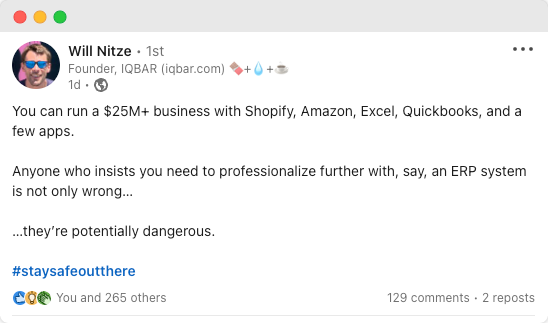A Framework for Freedom

The competition that I spend most of my time guiding, nudging, pushing, and encouraging people to overcome is doing nothing.
The bigger a business gets, the harder it gets for founders. They don't have all the information at their fingertips and can't make a gut decision that they can trust.
They have to rely on their team to make recommendations, but their team also operates the business daily. You can't run operations or product or e-commerce AND know everything about all the solutions in the market.
The most painful part of this is seeing decision-making slow down.
This sucks so much when you're an operator living the pain daily.
How can you make someone see how bad it is without them spending the time trying to do your job or your team's job?
We know Apps and Tools work because they make an impact fast.
This is where it pays to start small.
What is the first part of a solution you can roll out to create that wedge in your business that everyone can look at and say, 'We need to do more of that!'
The downside is that it can lead to implementing many tools without a cohesive plan to join them all up.
Buy an ERP, connect everything to it, and create a 'single source of truth'.
Founders often like the idea of their being a master plan they can comprehend, which is what the ERP hub+spoke model takes advantage of.
To go in another direction, you need to be comfortable with uncertainty because plans that propose to have it all figured out and be perfect are the last ones you want to commit your business to.
The more misadventures into ERP land we hear about, the more open our eyes are to alternative ways of running our businesses.

Framework
There are downsides to what we're doing with Airtable. For starters, if you go and sign up now, you'll spend the next 3 hours wondering what all the fuss is about.
But at least you can sign up and get a flavour.
Their pricing is public, and ours will be soon. I certainly don't try to hide what our solutions cost from people who evaluate them. The value for money is insane.
The biggest misconception is that it 'doesn't scale'. It's ironic, given that everyone runs on Google Sheets.
But what they're saying is it's not proven. For me, that's kinda like what Tesla had to deal with when they turned up with an electric car. That's why they went after the top end of the market - the sports cars. They matched them for 0-60mph and looked the part...but they didn't have a combustion engine.
Nolo Apps is delivering apps that can compete across 3-letter acronyms, and some brands are trading their ERP in for them. In truth, we've delivered features done by PIMs, PLMs, and SCMs.
Who cares about the category other than the marketers trying to sell them?
Rather than wondering why the adoption of these 3-letter acronyms that most people in brands have never heard of is so low - we've been breaking down the walls between all of them.
I am not anti-SaaS. If a great solution matches your needs, that is probably the way to go versus a custom solution.
But if you buy the market leader in all these things, they take too long to implement, the SaaS bill will be through the roof, integrations will be a spaghetti junction, and your Dark Stack will be bigger than ever.
What's missing is the framework that your specialist software connects to. The framework that owns the data sets and manages the cross-functional workflows. Doing so eliminates the dark stack and provides the top-down planning view you crave.
That is why we've built one.
Thanks, Oliver
